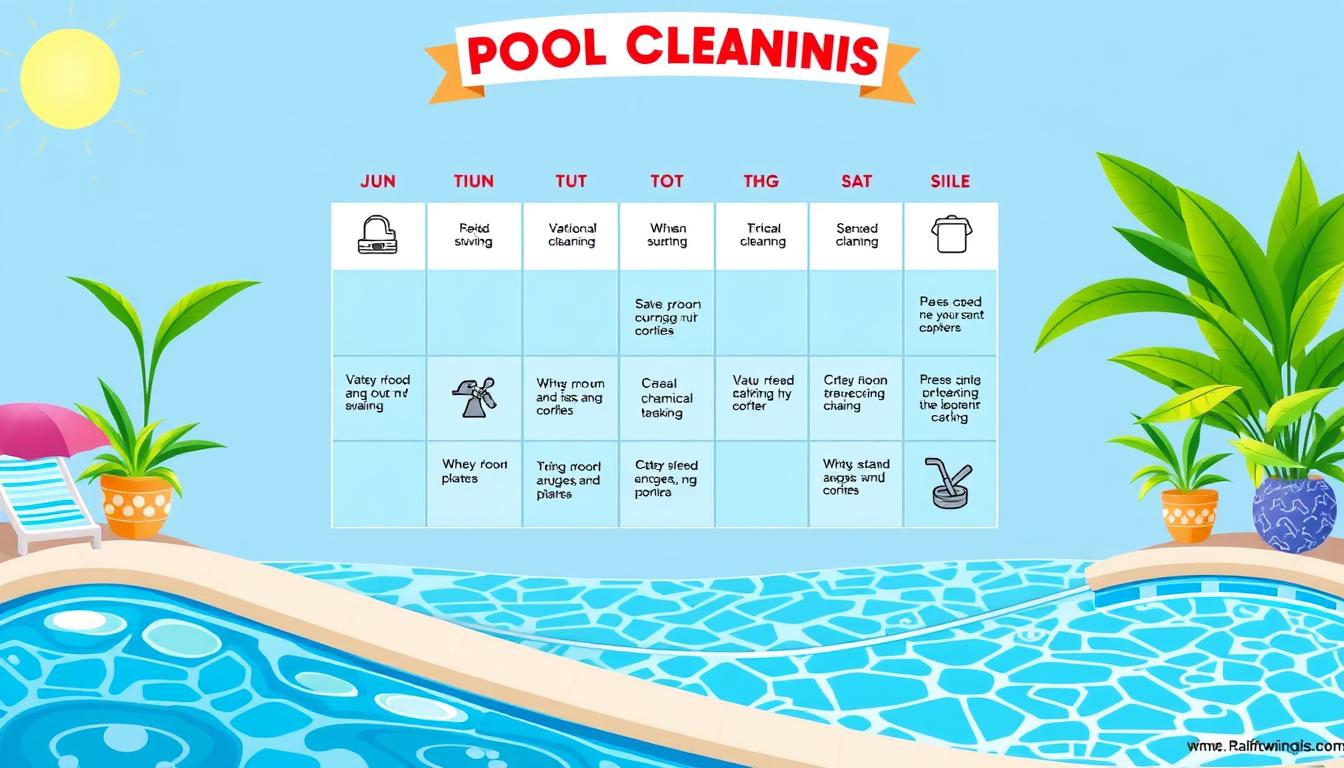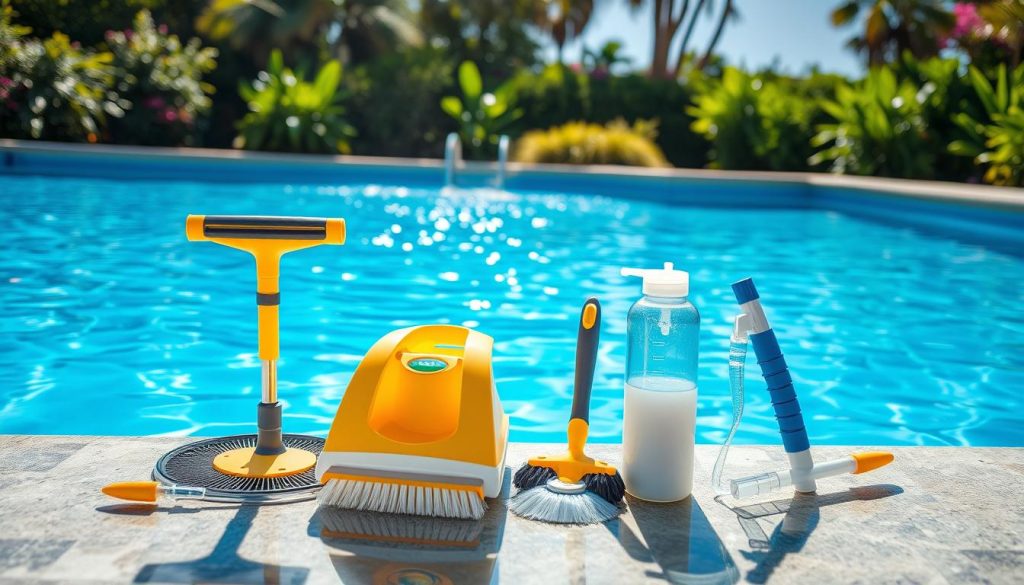
Ideal chlorine levels in a pool should be around 3 parts per million (PPM). Maintaining the right chemical balance is crucial for swimmer safety. A clean pool ensures a healthy and inviting swimming environment.
How often should you clean your pool? Let’s explore the best cleaning routine for crystal-clear water.
Pool cleaning frequency depends on size, environment, coverage, and usage. For residential pools, clean at least once a week. This includes skimming, vacuuming, and brushing to prevent algae growth.
Check and empty pump and skimmer baskets regularly. Maintain the filtration system by changing the pool filter every six months.
Commercial pools need more frequent cleaning due to higher usage. Clean these pools at least twice a week. Perform daily water balance checks and chemical adjustments.
Conduct monthly safety inspections, including equipment checks. This ensures optimal pool maintenance for commercial settings.
Key Takeaways
- Maintain ideal chlorine levels around 3 PPM for a healthy swimming environment
- Clean residential pools at least once a week, including skimming, vacuuming, and brushing
- Change pool filters every six months as a general rule
- Commercial pools require more frequent cleaning, at least twice a week
- Conduct daily water balance checks and monthly safety inspections for commercial pools
Understanding the Importance of Regular Pool Maintenance
Keeping a clean and healthy pool is crucial for pool owners. Regular maintenance ensures safety and enjoyment for families and guests. Following recommended cleaning practices prevents issues that can harm water quality and pool condition.
Why Consistent Pool Cleaning is Crucial for Health and Safety
Regular pool cleaning is vital for a safe swimming environment. Without proper treatment, harmful contaminants can quickly build up. This can lead to health risks for swimmers.
A strict cleaning schedule removes debris and balances water chemistry. It also keeps the filtration system working well. This approach prevents waterborne illnesses and keeps the pool safe.
Consequences of Neglecting Pool Care and Maintenance
Neglecting pool care can harm swimmers’ health and damage equipment. Without proper treatment, algae can quickly take over the pool. This creates an unsafe swimming environment.
Poor water chemistry can irritate skin and eyes. It can also damage the pool’s surface and equipment. Neglecting the filtration system can lead to clogged filters and pumps.
Ignoring small issues can result in bigger problems later. This might require expensive repairs or renovations. Regular maintenance is key to responsible pool ownership.
Regular pool maintenance is not just about keeping our pool looking pristine; it is a critical aspect of responsible pool ownership that directly impacts the health and safety of our loved ones and the long-term value of our investment.
| Maintenance Task | Frequency | Benefit |
|---|---|---|
| Skimming surface | 2-3 times a week | Removes debris and prevents staining |
| Vacuuming pool floor | Weekly | Prevents algae growth and maintains cleanliness |
| Testing water chemistry | Weekly | Ensures balanced pH, sanitizer, and alkalinity levels |
| Cleaning pool filter | Monthly or as needed | Maintains filtration efficiency and prevents clogs |
Prioritizing regular pool maintenance keeps our swimming environment safe and enjoyable. Following recommended cleaning practices ensures a healthy pool for years to come.
Essential Weekly Pool Cleaning Tasks for Crystal Clear Water
A consistent weekly pool cleaning routine is vital for a pristine swimming experience. Regular maintenance keeps your pool water sparkling clean and inviting. Let’s explore the key components of a thorough weekly pool cleaning regimen.

Skimming the Surface to Remove Debris
Skimming the water’s surface is a crucial weekly task. Use a skimmer or leaf net to remove floating debris. This prevents leaves and insects from sinking and decaying.
Daily skimming is recommended, especially during high pollen seasons. It enhances your pool’s appearance and maintains water quality.
Thorough Vacuuming of the Pool Floor
Weekly vacuuming removes dirt and organic matter from the pool floor. Use a manual or automatic pool cleaner for this task. Focus on corners and steps where debris often accumulates.
Regular vacuuming maintains water clarity and reduces strain on the filtration system. It also prevents the buildup of contaminants in your pool.
Brushing Pool Walls to Prevent Algae Growth
Brushing pool walls is crucial for preventing algae growth. Use a pool brush to scrub walls, steps, and ladders. Pay extra attention to areas with visible algae or stains.
Weekly brushing helps dislodge debris and disrupt algae growth. Increase frequency if you notice any signs of algae development.
Checking and Emptying Pump and Skimmer Baskets
Regularly check and empty pump and skimmer baskets. These components trap debris and ensure proper water circulation. Clogged baskets can restrict water flow and strain your pool pump.
Clean baskets maintain optimal water circulation and extend equipment life. Make this task part of your weekly pool maintenance routine.
| Pool Cleaning Task | Recommended Frequency |
|---|---|
| Skimming the Surface | Daily |
| Vacuuming the Pool Floor | Weekly |
| Brushing Pool Walls | Weekly |
| Checking and Emptying Baskets | Weekly |
Ensuring Proper Functioning of the Circulation and Filtration System
A well-functioning circulation and filtration system is crucial for a clean pool. Check that your pump, filter, and other equipment are working effectively. Monitor filter pressure and backwash when necessary.
Inspect pool equipment for signs of wear, leaks, or malfunctions. Address issues promptly to avoid costly repairs later.
These essential weekly tasks maintain clear water and prevent algae growth. They ensure a safe and enjoyable swimming environment for everyone.
Factors Influencing How Often Should You Clean Your Pool
Several key factors determine how often you should clean your pool. These include pool type, water quality, and usage. Saltwater pools need less maintenance than chlorine pools. The salt keeps the water cleaner for longer periods.
Chlorine pools may need more frequent water changes. This is due to chemical buildup over time. Using the right cleaning accessories is crucial. Proper water filtration also ensures optimal water quality.
Water hardness affects cleaning frequency too. Hard water has more minerals, which can accumulate. This affects water balance and requires more frequent cleaning. Soft water needs less maintenance.
Regular water chemistry testing is essential. Check pH (7.4-7.6), chlorine (1-3 ppm), alkalinity (80-120 ppm), and calcium hardness. This maintains water quality and prevents damage to surfaces and equipment.
Pool usage and weather changes impact cleaning needs. Heavily used pools need more frequent cleaning. The same goes for pools experiencing significant weather fluctuations. This ensures a safe, hygienic swimming environment.
Summer months require more attention to sanitizer levels. This is due to increased bather loads and warmer temperatures. Monitoring these factors helps optimize your pool’s cleanliness and longevity.







